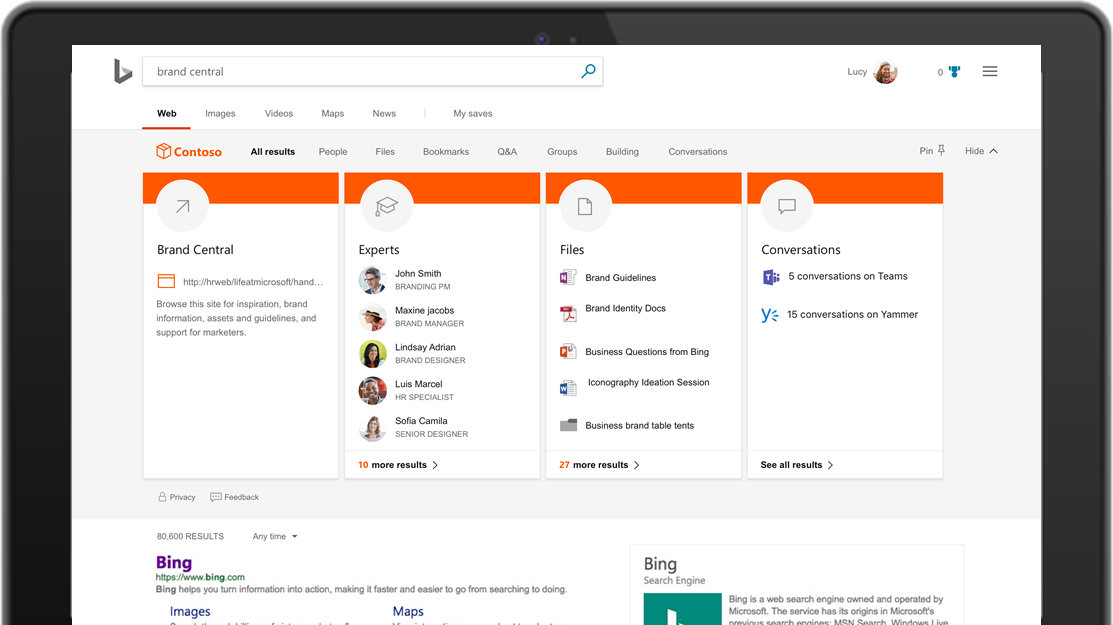Microsoft unveils an AI-powered search experience across Windows, Office and Bing
“Getting pages of results with hyperlinks to other information is simply not enough”


Microsoft has unveiled ambitious plans to unify its search platform between Bing and across its family of apps, dubbed "Microsoft Search."
"Getting pages of results with hyperlinks to other information is simply not enough," wrote Jeff Teper, Microsoft's corporate vice president for OneDrive, SharePoint and Office in a blog post. "Faced with ever decreasing attention spans, and an explosion of data, we recognise that the challenge is to find and deliver answers to your questions, suggest insights, and enable you to take action on your tasks.
"This makes search a powerful capability that stretches across your work to make you more productive and take advantage of the collective knowledge from your organisation."
That means a unified search experience across platforms, allowing search within Windows and its apps to quickly find relevant data, whether it's files, contacts or information.
Over the next few months, the in-app search box will appear in a unified position across Microsoft's family of apps, from Outlook to Teams. Personalised results will begin to generate as soon as you click or tap on the search field, with frequent contacts and recently worked on projects appearing first.
Not only will you be able to search for functions of the specific app (e.g: typing "acc" in Word will suggest "accept revision" or "accessibility checker") but assets related to other apps (e.g: PowerPoint presentations coming up within Word). If you're signed in, this functionality will extend to Bing, and Microsoft says you'll "get the same experience" wherever you search.
First to get the Microsoft Search functionality are the Outlook and SharePoint mobile apps, along with Office.com and Bing.com. Business users can see all this in action right now and, in the first half of 2019, Microsoft Search will extend to Office and the Windows Search bar.
Sign up today and you will receive a free copy of our Future Focus 2025 report - the leading guidance on AI, cybersecurity and other IT challenges as per 700+ senior executives
This is just the beginning for Microsoft Search, and Teper imagines the hunt for data becoming more useful as the AI gets better at semantic understanding. "A question such as Can my brother work for me at my company?' means that not only syntactic parsing of the question is necessary but semantic understanding," he writes.
After a false career start producing flash games, Alan Martin has been writing about phones, wearables and internet culture for over a decade with bylines all over the web and print.
Previously Deputy Editor of Alphr, he turned freelance in 2018 and his words can now be found all over the web, on the likes of Tom's Guide, The i, TechRadar, NME, Gizmodo, Coach, T3, The New Statesman and ShortList, as well as in the odd magazine and newspaper.
He's rarely seen not wearing at least one smartwatch, can talk your ear off about political biographies, and is a long-suffering fan of Derby County FC (which, on balance, he'd rather not talk about). He lives in London, right at the bottom of the Northern Line, long after you think it ends.
You can find Alan tweeting at @alan_p_martin, or email him at mralanpmartin@gmail.com.
-
 Poised for the future: Key cybersecurity growth opportunities for MSPs
Poised for the future: Key cybersecurity growth opportunities for MSPsIndustry Insights There are myriad opportunities on the horizon for partners who can tap into customer needs
-
 26% of privacy professionals are bracing for a breach this year
26% of privacy professionals are bracing for a breach this yearNews Overworked, underfunded privacy teams are being left hung out to dry by executives
